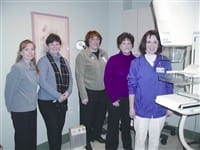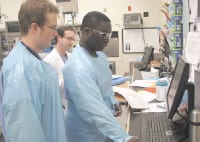A Noble Venture Evolves
Staff at The Women’s Center at Noble Hospital recently welcomed a new group of colleagues to their offices, who visited to take a tour of the facility in preparation for a new partnership that will greatly expand the scope of services available to the center’s patients.
The Women’s Center at Noble Hospital has entered into a collaboration with Baystate Medical Center that will allow the center’s patients to receive outpatient primary care close to home, and to take advantage of Baystate’s Wesson Women and Infants’ Unit and the hospital’s available technology and expertise.
The center, led by director Roberta Barron, FNP, already offers gynecological screening, exams, and treatments for women of all ages, diagnostic imaging services including mammography and bone density scanning, and a number of obstetric services and programs, and has been in operation on the Noble Hospital campus for seven years.
But the recent collaboration with Baystate has created a marked expansion in services, particularly in obstetrics. Patients can now receive primary care during pregnancy at the center, deliver their child at Baystate’s Wesson Women and Infants Unit, and later return to the women’s center for postpartum care.
Patients can also, if necessary, make the transition to Baystate for other services the center does not provide more seamlessly than in the past; in addition to obstetric services, patients in need of oncology care, for instance, are now simply ‘transferred’ to Baystate’s women’s unit rather than referred.
Barron calls the joint venture a move toward offering more convenient, comprehensive care to women living and working in the city of Westfield and surrounding towns, adding that although the Baystate/Noble partnership began at the women’s center only six months ago, patients are already returning positive feedback.
“So far, our patients have had positive things to say about the arrangement,” said Barron. “They don’t feel displaced or frightened once they reach Baystate, and they are raving about the staff there.”
Further, the partnership is helping to boost the numbers of patients utilizing the center’s services; the center currently has about 30 obstetric patients, and Barron expects those numbers to grow.
“To offer a visual, a year ago we had one shelf of files in our front office,” she said. “Now, that room is full.”
And a lot of that growth is due to word-of-mouth within the community, added Barron.
“We only just began marketing the center more formally,” she said. “We have a lot of women come in to give us a try because they heard from a friend or a relative that they had a good experience.”
And as the Baystate/Noble program continues to evolve, Barron said she hopes the women’s center will continue to grow as well, constantly changing to accommodate its patient base.
Deliver With Care
The new developments at the women’s center have already allowed its staff to focus more completely on one central mission: to offer the best obstetric and gynecological care possible to a diverse set of patients, and to ensure that care is given as comfortably and conveniently as possible.
“Convenience is a huge factor,” Barron said. “And as we continue to grow, we will continue to offer more to the people in the community. This collaboration with Baystate allows us to offer more specialty services and more complete care for patients, and that is wonderful for us.”
The idea of quality, comfortable care has long been a pervasive one throughout the center, which offers a host of diagnostic imaging and screening services including mammography, augmented by R2 Image Checker software and by MammoPads, which make the procedure more comfortable; bone density scanning; ultrasound, and stereotactic breast biopsy, which takes a smaller sample of tissue than a traditional breast biopsy, thus eliminating the need for anesthesia and significantly reducing scarring.
Nancy Rines, RN, BSN, unit manager for Labor/Delivery/Recovery/Postpartum (LDRP) at Wesson, said she is thrilled to be working with Noble through the collaborative program.
“I never knew what they offered at the center before now,” said Rines, “And it’s great. I’m so glad to be involved in this development, and to be able to see the impact it will have on the Westfield-area community.”
Both Rines and Barron said they have observed that the move toward offering more comprehensive care within the many communities of Western Mass. is a growing trend, as area hospitals strive to offer services that will complement patients’ lives and remove some of the fear often associated with driving to an unfamiliar city and medical facility to receive care.
Barron noted that in all of those communities – in this case, primarily Westfield, West Springfield, and the hilltowns – there are specific community needs that must be addressed, and the new collaboration with Baystate allows the women’s center to focus more on those needs by offering a larger package of services, therefore making gynecological services more accessible for teenagers, college students, the uninsured and underinsured, and those with language barriers – in Westfield, specifically the city’s Russian population, the second largest language group in the area.
“We’re working on raising people’s awareness of our services,” she said. “We have an interpreter on hand to assist with those patients that may need one, and we have participated in more than 18 health fairs in the last six months to help get the word out. Education is key for all patients, and especially those who might need a little extra help.”
Education has always been a primary focus at the center, which includes a resource library complete with books, CD-ROMs, brochures, and videos for all patients, and both outreach and on-site classes on topics such as childbirth for patients as well as the community at large. The center has grant-funded Women’s Health Network employees on staff, who assist the uninsured and underinsured in obtaining free mammograms, pap smears, cardiovascular screenings, nutritional counseling, physical exams, and other services.
Barron said the center is also currently formalizing a collaboration with Westfield State College, in order to provide testing, educational services, and treatment for its student population, and she has been visiting area middle schools and high schools to help better educate local students on the risks involved sexual activity.
With the addition of Baystate’s resources also comes added ease in providing education to patients specific to their treatment or their pregnancy, she said. Obstetric patients at Noble’s Women’s Center will, along with their families, receive tours of Baystate’s Wesson Women and Infants’ Unit to familiarize them with the hospital, staff, and many programs offered prior to delivery. Baystate also offers interpreter services for patients and their families in 24 languages including Spanish, Russian, Vietnamese, and sign language.
“Patient care is what it’s all about – it sounds simple, but it’s true,” said Rines.
“When you form a relationship like that which we now have with Baystate, it makes a difference in both service and how the community sees you,” added Barron. “We have always provided quality service, but now we can do even more for our patients in many ways.”
Crossing Bridges
Barron again underscored the importance of convenience in patient care, saying that the easier any medical experience is for a patient, the easier it is to administer care.
“People don’t like to ‘go over the river,’ she said. “Many people see crossing the bridges into Springfield as a major undertaking. For many of this area’s residents, receiving care nearby is a better solution, and when it is time to go to Springfield, they’re ready, because we have been educating them and making them feel as comfortable as possible.”
Since the partnership was instated, Barron said the center has seen 12 pregnancies through to the end – and welcomed 13 babies into the world.
She smiles when she equates those births with the success of her center.
“Noble is growing and changing,” she said, “and so are we. Everyday, we are better able to meet the needs of our patients – to make their visits more convenient, and to make them less afraid. That is really what it’s all about, and we are achieving that.”


